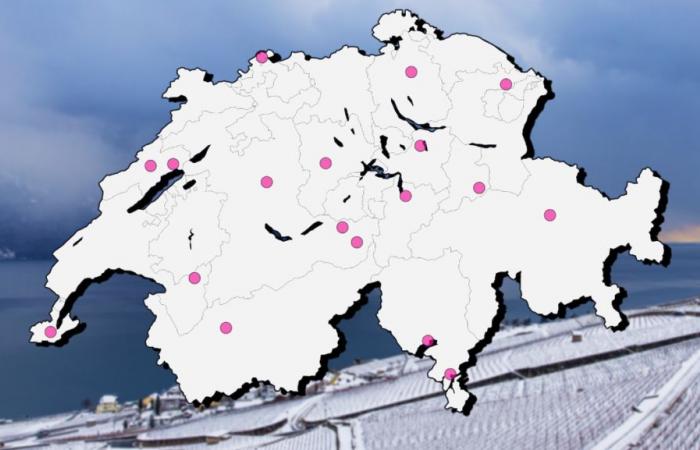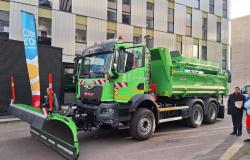In the plains, the first snow falls between the end of November and the end of December in Switzerland.Image: watson
The first snow of the season is expected in the plains these days. Normally, the first snow episodes take place a little later in French-speaking Switzerland. Here are the numbers.
Follow me
For many of us, the arrival of the first snow marks the beginning of winter, at least on a psychological level. We are there. Last week, the first snowflakes fell in the mountain regions. The plains should soon follow: the first snowfall was observed on Wednesday evening and, from this Thursday, up to 30 centimeters could fall.
If the forecasts are confirmed, these first snowfalls will be slightly earlier, at least in our part of the country. Indeed, in the plains of French-speaking Switzerland, the first measurable snow falls on average at the beginning of December, indicates MétéoSuisse. On the Central Plateau, this happens a few days earlier, at the end of November, while south of the Alps, you have to wait until around Christmas.
In Bern and Neuchâtel, the average date of the first snow is at the beginning of December, on the 2nd and 4th, respectively. In Geneva, this does not happen before December 17. As a general rule and quite logically, the higher the altitude, the earlier the snow appears. Château-d’Œx is an example: in the Vaud commune, located almost 1000 meters away, the first snowfalls occur much earlier, on November 9.
The date of the first measurable snow largely depends on the weather situation and varies greatly from one year to the next, recalls MétéoSwiss. It thus remains random, at least to a certain extent.
Sometimes, in fact, it snows much earlier than usual. In Geneva and Neuchâtel, it snowed on October 26 once, in 1939. Sion experienced its earliest snowfall on October 29, 2008.
Generally speaking, in the plain regions north of the Alps, this never happens before the last decade of October, underlines MétéoSwiss. In the more distant past, however, the first measurable snow was observed significantly earlier: for example, nine centimeters of snow were measured on September 28, 1885 in Zurich.
Other times, the flakes were delayed. In Geneva, during the winter of 2007-2008, the first snow of the season did not fall until the end of March. In the winter of 2019-2020 it didn’t snow at all, just like in Basel. Lugano has experienced six winters without snow since the late 1980s.
Net mild weather this weekend
Of course, sometimes it snows much earlier, without a snow cover forming. In fact, to be included in the statistics, the snow must reach at least one centimeter in height.
In addition, the measurement is carried out manually only once a day, at 7:00 a.m. If the snow melts or is washed away by rain in the meantime, it is also not included in the statistics.
Measurable or not, this first snowy episode should not prove to last long. According to Meteonews, the polar air arriving this Wednesday will be followed by a clear warm spell by the end of the weekend, particularly at altitude. Between Thursday and Sunday, we could gain nearly 20 degrees at 1500 m altitude.
More articles on the weather in Switzerland
On Friday, November 22, many Swiss and Europeans will go to tobacco stores to get rich thanks to the Loterie Romande.
The principle is simple: this Friday, November 22, EuroMillions and its ten partner lotteries, including Loterie Romande, are organizing a new edition of the famous “rain of millionaires”. This will be only the fifth “rain” since 2004, the year EuroMillions was created. During the last one, in February 2023, thatother Swiss had won the millionincluding a player from French-speaking Switzerland.







